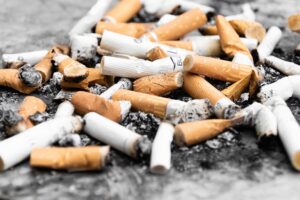WHO says tobacco industry should be held responsible for environmental damages
The World Health Organisation (WHO) is today calling for the tobacco industry to be held accountable for the detrimental impact it has on the environment and human health.
The organisation says the industry causes around eight million deaths every year, as well as 600 million trees, 200,000 hectares of land, 22 billion tonnes of water and 82 million tonnes of CO2.
A report, Tobacco: Poisoning Our Planet, highlights the environmental impact too, with the industry’s carbon footprint being equivalent to one-fifth of the CO2 produced by airlines each year.

Dr Ruediger Krech, Director of Health Promotion at WHO, said: ‘Tobacco products are the most littered item on the planet, containing over 7,000 toxic chemicals, which leech into our environment when discarded. Roughly 4.5 trillion cigarette filters pollute our oceans, rivers, city sidewalks, parks, soil and beaches every year.’
Tobacco is mainly grown in developing nations, where water and farmland, which could be used to grow food, is being used to grow tobacco, while large areas of forest are being cleared.
The industry is also responsible for a large proportion of litter, since cigarette filters contain microplastics and make up the second-highest form of plastic pollution worldwide.
WHO is now calling on policy-makers to treat cigarette filters as single use plastics and consider a ban to protect people and the environment.
Taxpayers currently have to cover the costs of clearing up discarded littered tobacco products, which costs China around $2.6bn, India $766m and Brazil and Germany over $200m.
However, some nations like France and Spain and cities like San Francisco have adopted the Polluter Pays Principle which forces the tobacco industry to pay for clearing up the litter it creates.
WHO is now urging other countries and cities to follow the same method, alongside giving support to tobacco farmers to switch to sustainable crops, implementing strong tobacco taxes and offering support services to help people quit the deadly habit.
In related news, an international team of experts have called for the creation of an observation network to monitor the effect of airborne plastic pollution on oceans.
Photo by Pawel Czerwinski















nice
good